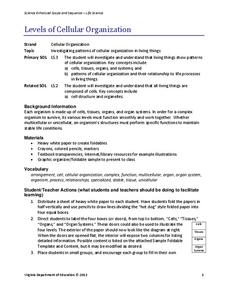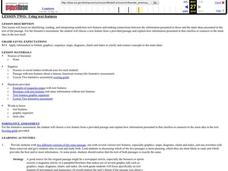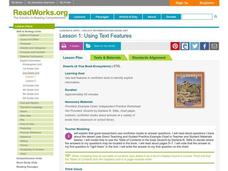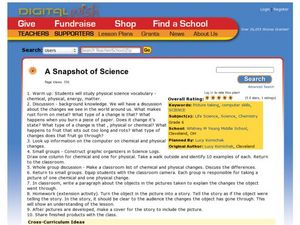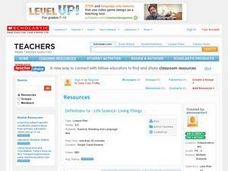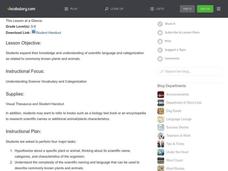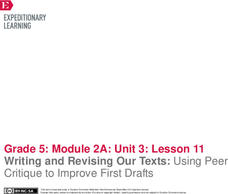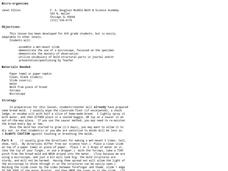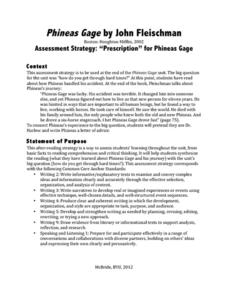Virginia Department of Education
Levels of Cellular Organization
What an eccentric way to learn about each level of cellular organization! Allow emerging biologists to utilize white paper and create their own foldable charts to describe each level of organization in the body. You may also adapt the...
Curated OER
Locate Key Information in Nonfiction Text
Interpret nonfiction text with your class. Readers use key information found in nonfiction text to answer questions and problem solve. They utilize the chapter headings, diagrams, glossary, maps, and captions as well as the table of...
Curated OER
Ornithology and Real World Science
Double click that mouse because you just found an amazing lesson plan! This cross-curricular Ornithology lesson plan incorporates literature, writing, reading informational text, data collection, scientific inquiry, Internet research,...
Curated OER
Using Text Features
Fourth graders read a nonfiction story that is presented to them with graphic features, and presented to them with only the text. In this text features lesson, 4th graders decide what the benefits of text organizers are and create their...
Curated OER
Using Text Features
Investigate a "table of contents" with your students! They read the table of contents in Deserts by Darlene R. Stille and predict where the answers to specific questions might be found. Learners complete a worksheet in which they find...
Alabama Learning Exchange
The Big Bang Theory: An Evidence-Based Argument
What evidence supports the big bang theory? Individuals analyze scholarly resources about the the theory and develop arguments backed by evidence. They brainstorm, share ideas, watch a video, and read articles to complete a graphic...
Curated OER
A Snapshot of Science
Sixth graders explore physical and chemical changes. In this physical science lesson, 6th graders study vocabulary, discuss the changes they see in the world and look up information on chemical and physical changes. Students create...
Curated OER
Genre Lesson: Science Fiction
Sixth graders explore the components of science fiction in a science and literacy activity. As they define and record definitions of the term on the board, learners identify a text as science fiction using the terms they have listed to...
Curated OER
Chemistry Study Room
In this chemistry worksheet, students are offered a variety of assistance to help them be successful in organic chemistry. They will have access to the library, missed class notes and computer interactive programs to help them with...
Baylor College
What Is a Neuron?
Your class won't get on your nerves while doing this modeling activity! After teaching the structure and function of a neuron using the included diagrams, give individuals some clay and chenille stems so that they can make their own...
Baylor College
Neural Network Signals
Using a simple circuit with the battery representing the brain, future physiologists test to see which solutions conduct electrical "nerve impulses." Enlighten learners with plentiful information on electric signals in the nervous system...
Curated OER
Life Science: Living Things
Have your class build their vocabulary bank by studying life science terms. Basic terms like organism, cell, unicellular, and vertebrate are included on the definition sheet provided. Demonstrate how to identify different life science...
Curated OER
Readings in Hudson River Natural History
Reading and understanding informational text is a key element to understanding every discipline. Elementary learners read three different articles focused on various animals and habitats in the Hudson River. They answer comprehension...
Curated OER
Characteristics of Nonfiction
The second lesson in a series from ReadWorks.org, this lesson continues to explore the difference between fiction and nonfiction texts. The lesson opens with the teacher reviewing a class Venn diagram started in the last lesson....
Curated OER
Understanding Science Vocabulary and Categorization
Students analyze scientific vocabulary words. In this life science vocabulary lesson, students complete a worksheet using VisualThesaurus as they evaluate words related to plants and animals and how the words are used.
Earth Day Network
Staying Green While Being Clean
Clean up the environment with a lesson that focuses on replacing hazardous cleaning supplies with green, environmentally-friendly products. Using a dirty patch of surface as a control area, kids clean other parts of various surfaces...
Polar Trec
Drawing Diatoms like Ernst Haeckel
Why do scientists rely on drawings rather than just photographs of their research studies? The lesson introduces drawings of microscopic organisms and the importance of accuracy. Young artists draw organisms and learn why focus and...
EngageNY
Writing and Revising Our Texts: Using Peer Critique to Improve First Drafts
Mail me a postcard. Individuals design a postcard to show what Meg Lowman from The Most Beautiful Roof in the
World might have written to her friends at home. They then continue to work on writing a science journal entry.
Curated OER
Text Structures in Science Writing
Students recognize that science writing is organized in identifiable patterns called text structures. Understanding and using these different text structures help refine students' abilities to read and write in science.
Curated OER
Micros-organisms
Sixth graders examine mold with a microscope. In this micro-organisms lesson, 6th graders use teacher-prepared mold samples to prepare a wet-mount slide and examine the mold under a microscope then draw and label what they see.
Curated OER
Graphic Organizers for Good Science Reading and Writing
Learners use reading and writing strategies to explain informational text in science. They create and use different types of graphic organizers to understand, interpret, and analyze informational text.
Curated OER
Using Multicultural Literature with Science
Fourth graders listen to The Great Ball Game and discuss the roots of the tale. In this multicultural tale students identify the realistic facts about the Abnenaki Indians. Students use the Internet to find out about the author and...
Lakeshorelearning
Read and Write about It
Reading informational text is a skill that transcends subjects and grade levels. Practice reading about different topics in various formats with a language arts lesson that includes opportunities for writing and research as well.
Curated OER
Phineas Gage: Assessment Strategy
Close up your study of Phineas Gage: A Gruesome but True Story About Brain Science with a letter-writing assignment. Pupils prepare by journaling and sharing with a partner. They then compose letters that focus on a big idea from the...


